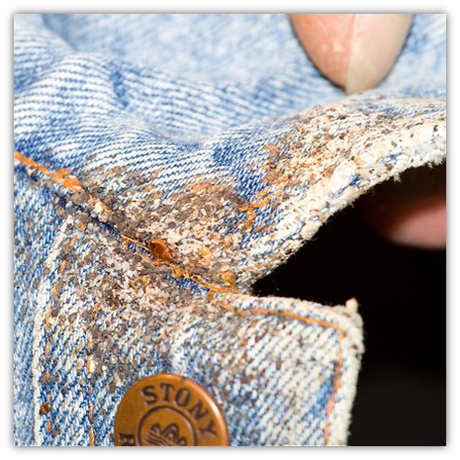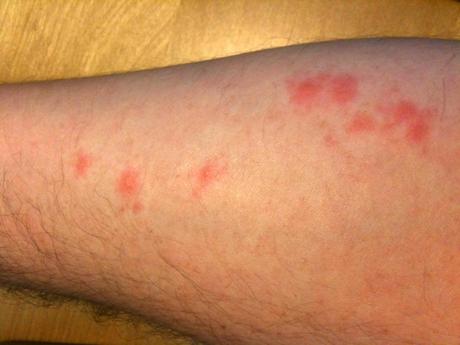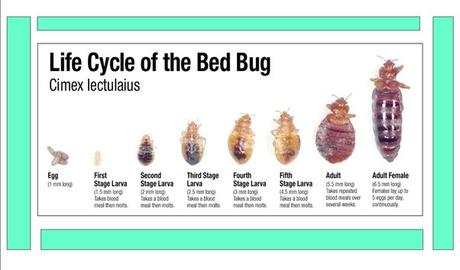Bed bugs can travel on clothes you’re wearing, but it is unlikely that they would live in the clothes you’re actually wearing due to your constant movement. However, they can quickly take up residence on items in a suitcase, in your drawers, or on the floor.
Washing clothes after returning from a trip can help reduce the population of bed bugs, but it may not completely eliminate them. Bed bugs are expert hitchhikers and can easily catch a ride on your coat, suitcase, or other outerwear.
Therefore, it is important to be vigilant and take preventive measures to stop them from spreading.

Credit: www.greenwavepestsolutions.com
Can Bed Bugs Travel On Clothes You’re Wearing?
Bed bugs are unlikely to live on the clothes you’re wearing, but they can easily take up residence on items in your suitcase or in your drawers or on your floor. It’s important to launder items after returning from a trip to reduce the risk of bed bug infestations.
How Likely Are Bed Bugs To Travel On Your Clothes?
Bed bugs are notorious hitchhikers and can easily travel on your clothes. They can hide in the seams of your clothing, shoes, or even in the folds of your luggage. When you unpack, they can crawl out and infest your home. So, if you’ve ever wondered if bed bugs travel on people, the answer is yes! These resilient pests can find a ride on you or in your suitcase.
Can Bed Bugs Stay In Your Hair?
While bed bugs feed off human or animal blood, they are not adapted to live in your hair. It’s possible for a bed bug to end up in your hair after biting your scalp, but it’s much more likely to be a sign of head lice. Bed bugs typically prefer hiding in cracks and crevices, such as the seams of your mattress or cracks in your bed frame.
Can Bed Bugs Live In Your Clothes?
Bed bugs can temporarily live in your clothes, especially if they are infesting your home. However, they prefer to hide and lay their eggs in furniture, bedding, and other fabric-covered items. It’s essential to regularly wash and heat-dry your bed sheets, blankets, and any clothing that comes into contact with the floor to reduce the number of bed bugs.
Can Bed Bugs Be Spread By Sharing Clothing?
Sharing clothing can indeed spread bed bugs. If someone who is infested with bed bugs shares their clothes with you, there’s a high chance that the bugs will transfer to your clothing. Bed bugs can easily crawl from one fabric item to another, whether it’s through direct contact or by hitching a ride. It’s crucial to be cautious when borrowing or lending clothes, especially if you suspect a bed bug infestation.

Credit: www.greenpestsolutions.com
Preventing The Spread Of Bed Bugs
Bed bugs are pesky insects that can quickly infest your home if given the opportunity. While it’s unlikely for them to live on the clothes you’re wearing, they can easily hitch a ride on items in your suitcase or find a cozy spot in your drawers or on your floor. To prevent the spread of bed bugs, it’s essential to take certain precautions. By following a few simple steps, you can minimize the risk of bringing these unwelcome pests into your home.
Regularly Wash And Heat-dry Your Bed Sheets And Clothing
To reduce the number of bed bugs and their eggs, it’s crucial to regularly wash and heat-dry your bed sheets, blankets, and any clothing that comes into contact with the floor. Washing clothes alone may not be enough to eliminate bed bugs, but heat-drying them can effectively kill these pests. The high temperatures of the dryer are lethal to bed bugs, ensuring that any hitchhikers are eliminated. Make sure to follow the care instructions on clothing labels and select the appropriate heat setting to avoid damaging your clothes.
Clean Laundry Containers And Hampers
Laundry containers and hampers can serve as hiding spots for bed bugs, especially if infested clothing is left inside. It’s essential to clean these containers regularly to prevent the spread of bed bugs. Empty and thoroughly clean your laundry containers or hampers after each use. Use hot, soapy water and a scrub brush to remove any potential hiding places. Afterward, ensure they are completely dry before using them again. Maintaining cleanliness in your laundry storage areas is crucial in minimizing the risk of bed bug infestation.
Take Precautions When Traveling With Clothing
If you’re traveling, it’s important to take extra precautions to avoid bringing bed bugs back home with you. Start by packing your clothing in sealed bags to prevent bed bugs from hitching a ride. Choose luggage or suitcases with hard exteriors as they are less likely to harbor bed bugs. Upon arriving at your destination, keep your clothes stored in sealed bags or hang them up in a closet away from the bed. After your trip, wash and heat-dry all your clothes, including those that remained in your suitcase. This ensures that any potential bed bugs are eliminated and prevents their spread into your home.
By following these preventive measures, you can significantly reduce the risk of spreading bed bugs and protect your home from infestation. Remember to be diligent in your cleaning routine and take necessary precautions while traveling to keep these pesky pests at bay.
Bed Bug Behavior
Understanding the behavior of bed bugs is crucial in preventing and dealing with infestations. By understanding how these pests reproduce, spread from one home to another, and how to protect yourself against them, you can take effective steps to keep them out of your home and minimize the risks they pose. In this section, we’ll explore the various aspects of bed bug behavior that you should be aware of.
How Bed Bugs Reproduce
Bed bugs reproduce quickly and prolifically, which is one of the reasons why they can be so difficult to eliminate once they infest a home. A female bed bug can lay hundreds of eggs in her lifetime, which are extremely small and difficult to detect. These eggs hatch into nymphs, which go through several molting stages before reaching adulthood. The entire life cycle, from egg to adult bed bug, typically takes around 5 to 8 weeks, depending on various factors such as temperature and availability of food.
Home-to-home Spread Of Bed Bugs
Bed bugs are notorious for their ability to hitchhike and spread from one home to another. They can easily latch onto clothing, luggage, furniture, or any other item that they come into contact with. When a person unknowingly carries bed bugs on their clothes or belongings and enters a new environment, these pests can quickly infest the new space. Therefore, it’s important to be cautious when traveling or visiting places with a high risk of bed bug infestation, such as hotels or public transportation.
Prevention And Protection Against Bed Bugs
Preventing a bed bug infestation is much easier and less costly than dealing with one. There are several steps you can take to protect yourself and your home:
- Regularly wash and heat-dry your bed sheets, blankets, and any clothing that comes into contact with the floor. This helps reduce the number of bed bugs and eliminates any eggs that may be present.
- Inspect and vacuum your luggage after returning from a trip. Pay close attention to the seams and folds where bed bugs may hide.
- When staying in a hotel or rental accommodation, thoroughly inspect the mattress, headboard, and furniture for any signs of bed bugs. If you notice any red flags, such as blood stains, dark spots, or live bugs, request a room change or find alternative accommodation.
- Use protective mattress and pillow covers that are specifically designed to prevent bed bugs from infesting your sleeping area.
- Keep your home clutter-free and minimize hiding places for bed bugs. Regularly vacuum and clean your living spaces, paying attention to cracks, crevices, and furniture seams.
By following these prevention measures and being cautious when traveling, you can significantly reduce the risk of a bed bug infestation in your home. Remember, early detection and prompt action are key in effectively dealing with bed bugs, so stay vigilant and address any signs of infestation immediately.

Credit: www.quora.com
Frequently Asked Questions On Can Bed Bugs Travel On Clothes You’re Wearing?
Will Bed Bugs Stay On Clothes You’re Wearing?
Bed bugs won’t stay on the clothes you’re wearing, but they can easily hide in your luggage or infest your home when you unpack. Always wash your clothes after traveling to reduce the risk.
How Likely Are Bed Bugs To Travel On Your Clothes?
Bed bugs are unlikely to live on the clothes you’re wearing, but they can easily infest items in your suitcase or on the floor. They can also hitch a ride on your clothes and end up in your home. Always wash your clothes after traveling to reduce the risk of bringing bed bugs home.
How Do You Stop Bed Bugs From Spreading?
To stop bed bugs from spreading, regularly wash and heat-dry your bed sheets, blankets, and any clothes that touch the floor. Clean your laundry containers and hampers as well. It’s unlikely for bed bugs to live on the clothes you’re wearing, but they can infest items in a suitcase or in your drawers and floor.
Can Bed Bugs Stay In Your Hair?
Bed bugs are unlikely to stay in your hair, but they can quickly infest items in your suitcase or on your floor. Always launder items after traveling to reduce the population. Bed bugs can hide in clothes and personal belongings, so be careful when unpacking.
Can Bed Bugs Travel On The Clothes You’re Wearing?
Yes, bed bugs can travel on the clothes you’re wearing, but they are more likely to infest items in your suitcase or on your floor.
Conclusion
To answer the question, bed bugs can indeed travel on clothes you’re wearing. Although they may not typically live on the clothes you have on, they can easily transfer to items in your suitcase or other belongings. It’s important to be cautious and thoroughly launder your items after traveling to prevent any potential infestations in your home.
Washing your clothes can help reduce the bed bug population, but it may not completely eliminate them. Take proactive measures like regularly washing and heat-drying your bedding and clothing to prevent their spread.
